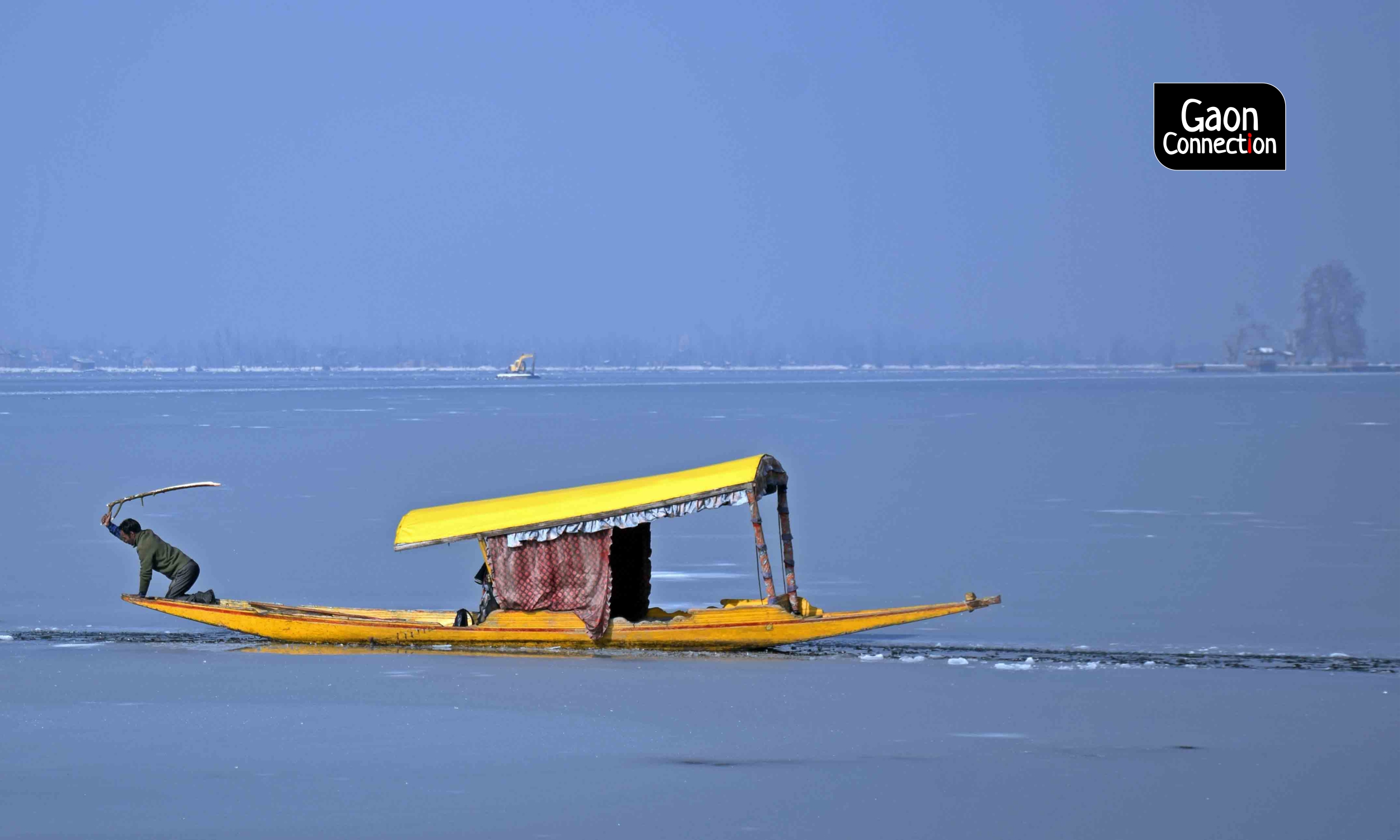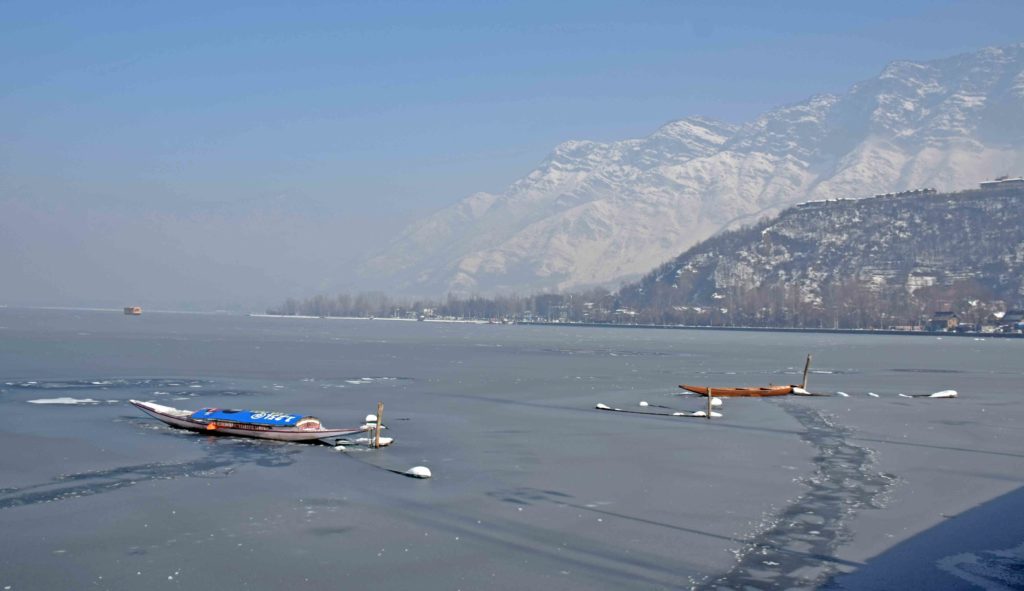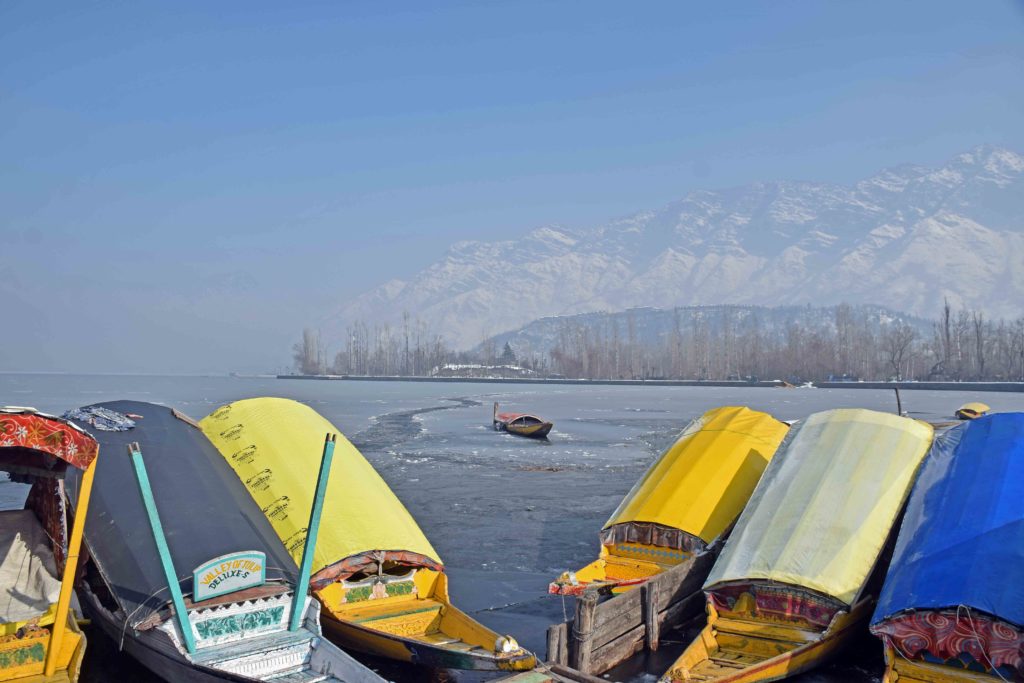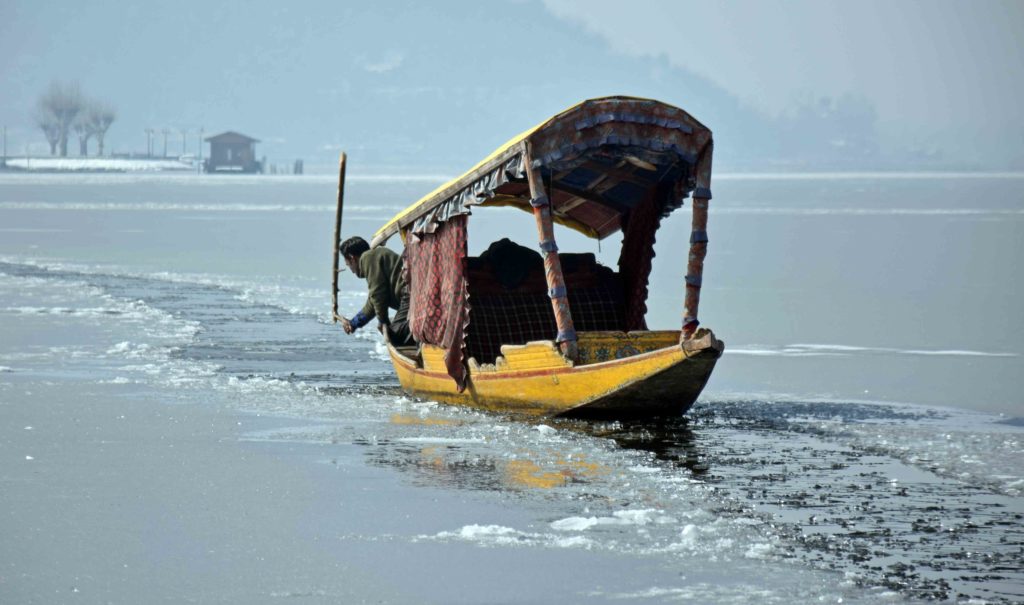A Winter’s Tale: As Dal Lake in Srinagar freezes over, houseboat owners, shikara owners, vegetable vendors and fisherfolk lose their livelihood
Kashmir is under the grip of chillai-kalan, the harshest period of winter, that has left the Dal Lake covered in a thick layer of ice, not seen in at least two decades, say the many people whose livelihood depends on the lake.


Srinagar, Jammu & Kashmir
It is for the first time in 20 years that Mohammad Yusuf, a shikara owner, has had to stay home for over a week without rowing his boat out at the Dal Lake. The 45-year-old said he had never seen the lake frozen so hard.
“The ice was more than two inches thick. I preferred to stay at home for seven days. It was just not possible to row the shikara,” Yusuf told Gaon Connection. “A lot of tourists are here to see snowfall. Due to the frozen lake, we are not able to row them in the shikaras, disappointing many of them,” he added.
According to Yusuf, he earned between Rs 400 and Rs 600 a day till the first week of January rowing tourists around the lake. But, since the second week, his business has dried up and he estimates he would have probably lost nearly Rs 5,000 to Rs 6,000 worth of income because of the big freeze in Dal Lake.
Like Yusuf, more than 40,000 people depend on Dal Lake for sustenance, including shikara owners, houseboat owners, vegetable growers, traders dealing with handicrafts, and fisherfolk. Tourism, agriculture, and fishing form the backbone of the economy emerging from the lake.
And a frozen lake means loss of daily income for thousands of these local people.

Kashmir has been under intense cold since the second week of January. Srinagar, the summer capital of Jammu and Kashmir recorded a low of minus 8.4 degrees celsius on January 14, which was the coldest recorded temperature in the last 30 years. In 1991, the temperature fell to minus 11.3 degrees celsius. (The lowest temperature ever recorded in Srinagar was minus 14.4 degrees celsius in 1893.)
Kashmir is currently under the grip of 40 days ‘chillai-kalan’, the harshest period of winter, which begins from December 21 and ends on January 31.
While the lake does freeze in the winters, it has never been so severe that it has restricted the movement of shikaras on it. But this year, the freeze has reduced tourist activity and therefore made life difficult for those who depend on it for a livelihood. A big part of the lake has been frozen longer than usual.
Troubled waters
There are more than 4,500 registered shikaras owners in Dal Lake. However, at present less than 800 are active and others have switched to other jobs due to a decline in tourists post August 2019.
“We are entirely dependent on tourism. Our sector was badly hit, first, post the abrogation of Article 370 in August 2019, then the COVID-19 pandemic and now the frozen lake,” rued Yusuf.

Not just tourists, even the local inhabitants are struggling with the cold and the frozen conditions.
“It took me more than two hours to break the ice and then reach the market,” Javid Ahmad told Gaon Connection. The 40-year-old said that to traverse a distance of a kilometre that would normally take him 15 minutes by shikara, took him a couple of hours.
“This winter has been one of the hardest winters we have seen in decades. Not only has our livelihood been hit, even buying our basic essentials has become a struggle,” said Ahmad who deals in Kashmiri handicrafts.
The vegetable vendors who sell their produce at the floating market early in the mornings on the lake are also hard hit. “There used to be more than 500 people selling vegetables at this market each day. But as the lake is frozen, only a small percentage from nearby areas is able to reach here and do business,” Manzoor Dar, a vegetable grower, told Gaon Connection. He said it was not worth the effort spending hours in the mornings breaking the ice. “We instead sell vegetables at low prices to buyers who visit our homes in the afternoon,” he added.
Vegetables including tomatoes, carrot, turnips and nadru (Lotus stem) traded in this floating market are supplied to Srinagar and many towns across the Kashmir valley.
There was a huge booking of tourists for the houseboats from December 15 to the first week of January. But the severe cold and the gradual freezing over of the lake has resulted in only about 15 per cent occupancy on the houseboats. There are more than 1,200 houseboats in Dal and Nigeen lakes (a narrow strait connects the two lakes). At present each room costs between Rs 1,500 and Rs 5,000 per day, depending on the quality and the services provided.
“As tourists are not able to take a shikara ride, most prefer to stay in hotels,” Parvaiz Ahmad, a houseboat owner said. “Breaking ice every morning takes up too much time for the tourists,” he said.

Breaking ice
Ghulam Mohammad, a 55-year-old fisherman, recalled a time in the 1990s when there was more than eight inches of ice over the Dal Lake. And this year, even with two to three inches of ice, it was impossible to break the surface, he said.
While he usually caught at least three kilogrammes (kgs) of fish every day, for the last 10 days he has caught only 12 kgs of fish because the lake is frozen. “When we are unable to move around the lake, how can we catch the fish? To catch fish, we have to break ice for hours,” he said.
But for 55-year-old Parvaiz Ahmad, he says he has not seen three inches of ice on the surface of the lake in his lifetime. “People are walking over the ice and every morning we have to break the ice with boat paddles to ferry tourists to the road, where their vehicles await them,” he said.
Meanwhile, the tourists, who have braved the winters in Srinagar, are making the most of their time posing and taking selfies on the Dal Lake. A worried Srinagar district administration has issued an advisory asking people not to do that. “We have asked the people not to venture out on the frozen parts of Dal Lake as it is melting in parts. This can be dangerous,” Shahid Iqbal Choudhary, deputy commissioner, Srinagar told Gaon Connection. “We have deployed quick reaction teams at the lake,” he added.

